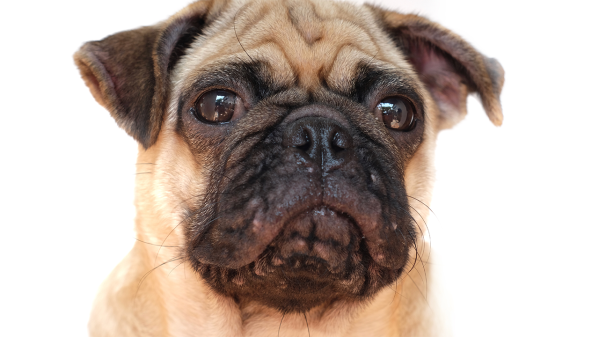If you notice that your dog has pimples, you might be confused about what's causing them.
Canine acne is a condition that affects the skin of the lips and the muzzle of dogs. It causes red bumps or pimples (also called pustules) in those areas and can lead to wounds and even swelling of the lips and muzzle if left untreated.
Let's discuss what causes canine acne, how it's diagnosed, and the best treatment options available for your pup.
What is canine acne and what causes it?
Canine acne is an inflammatory condition of the skin and hair follicles around the lips and muzzle. It's usually seen in dogs around the ages of 6-12 months, although some older dogs can also get acne if there is an underlying cause. All dog breeds can get acne, but there are some breeds that seem to be predisposed. Short-nosed breeds, doberman pinschers, Great Danes, boxers, English bulldogs, German shorthaired pointers, mastiffs, and rottweilers tend to be more affected by acne than other breeds.
When the hair follicle becomes inflamed, it tends to cause small red bumps. Bacterial infection is very often seen and will cause the small yellow pustules that resemble pimples in humans. These bumps and pustules can sometimes rupture and cause more severe inflammation and swelling.
The underlying causes for canine acne are largely unknown, but there are some factors that are thought to cause a role:
Rubbing of the face against objects or rough surfaces
Plastic bowls that might cause irritation
Underlying allergies
Age (most cases of acne will clear up by the age of 12 months)
There are some other skin conditions that also occur more often in younger dogs and can look similar to canine acne or even act as an underlying cause for the development of canine acne. These conditions include parasitic infections caused by Demodex mites, fungal infections like ringworm, and puppy strangles.
How is canine acne diagnosed?
Canine acne has a relatively characteristic appearance and can sometimes be diagnosed by that alone. Your vet will try to find out if there is an underlying cause for the acne and will question you on your pup’s environment, any recent changes to the environment, the type of food and food bowls used, and any other symptoms like excessive rubbing of the face and mouth.
Your vet might also want to do some extra diagnostic tests, including skin scrapes, hair plucks, skin biopsies, and bacterial culture and sensitivity tests. These tests are used to look for underlying causes like Demodex infestation and fungal infections, and the bacterial culture and sensitivity tests are used to determine the type of bacteria involved and the best antibiotic for treatment.
How is canine acne treated?
If your dog has pimples, you're likely eager to find a solution that can help. Canine acne will be treated according to the severity as well as any underlying causes. Treatment of canine acne can include:
Topical treatment
This can include antibiotic, anti-fungal, or anti-inflammatory ointments that are used directly on the affected skin.
Oral treatment
Oral treatment is medication that is given by mouth instead of applied directly to the affected area. These medications include antibiotics, anti-inflammatories, and anti-fungal medications.
Skin cleansing treatment
These treatments include special antiseptic shampoos, wipes, and ointments to cleanse the skin and also help prevent recurrence of the acne.
Your vet will often make some recommendations to try to prevent recurrence of canine acne. These can include things like regular cleaning of the lips and muzzle, using stainless steel food and water bowls, and preventing excessive rubbing of the face. It's very important you do not squeeze the pimples, as you can cause them to rupture and worsen the inflammation, swelling, and pain.
It can sometimes be difficult to know what you are dealing with when you see swelling, bumps, or pustules on your dog’s skin. When in doubt, speak to a Pro at Pawp—they can help you figure out what could be going on and what you need to do next.

Reviewed and fact-checked by
Dr. Mari, DVM at Pawp
